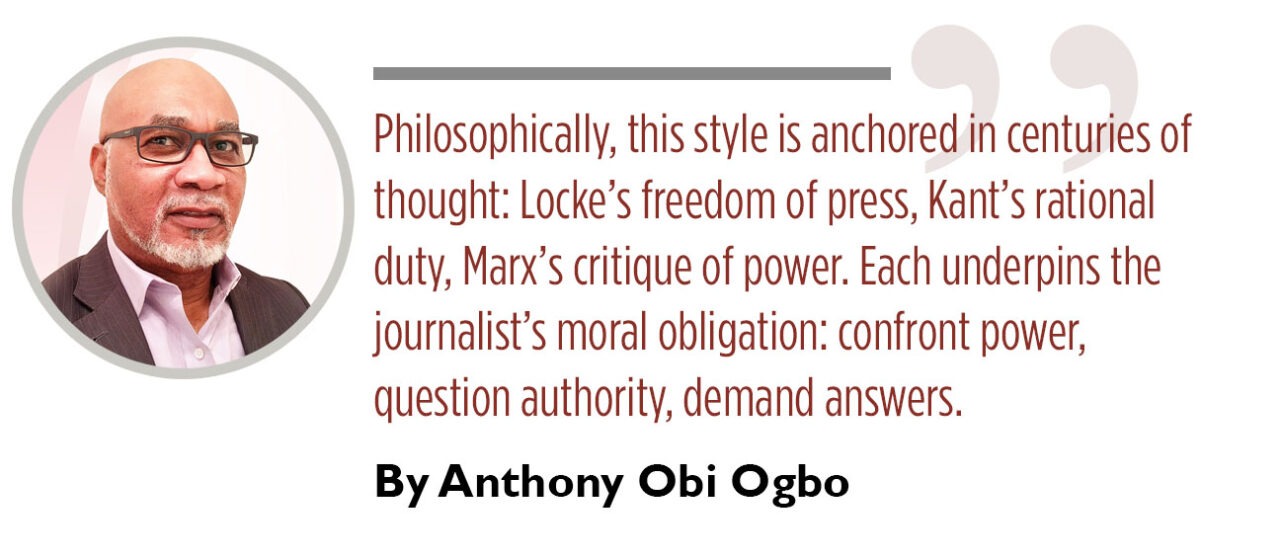“Adversarial reporting isn’t polite—it pierces secrecy, demands answers, and holds leaders accountable.“ —Anthony Obi Ogbo
October 7, 2025, will be remembered as the day Rufai Oseni took Minister David Umahi to task live on Arise TV. The Lagos–Calabar Highway project, a ₦15 trillion undertaking under President Tinubu, became a battlefield of accountability versus ego. But the broadcast didn’t just entertain—it instructed.

In my advanced reporting class, I had been waiting for this exact moment. Using Oseni’s interview, I could dissect modern journalism in action. Oseni, co-host of Arise TV’s Morning Show, is known for being fearless, confrontational, and unapologetically direct. Social media erupted, some praising his courage, others decrying his style—but every reaction confirmed his impact.
Let’s be clear: Oseni is not a traditional reporter. Like Rachel Maddow, Tucker Carlson, and Seymour Hersh, he is a host with an agenda: uncover corruption, expose abuses of power, and interrogate government missteps. This is not bias—it is a deliberate approach to journalism beyond neutral storytelling.
Modern journalism stretches beyond conventional objectivity. Three approaches dominate today:
- Adversarial journalism: exposes wrongdoing, challenges authority.
- Advocacy journalism: promotes social or political causes.
- Radical journalism: seeks systemic change, amplifies marginalized voices, and confronts entrenched power.
Oseni operates firmly in the adversarial camp. He interrogates, he presses, he refuses platitudes. Critics note his lack of a journalism degree. That argument collapses under scrutiny. Journalism has never been a diploma-driven field. Anderson Cooper (political science, Yale), Tucker Carlson (history, Trinity College), Oprah Winfrey (partial communications study), and David Muir (communications, Syracuse) succeeded without formal credentials. Skill, rigor, and courage matter far more.
The stakes are immense. Adversarial journalism holds leaders accountable, enforces transparency, empowers citizens, and strengthens democracy. It positions journalists as watchdogs of power, not passive observers. Without it, corruption festers, policy fails, and citizens remain uninformed.
Philosophically, this style is anchored in centuries of thought: Locke’s freedom of press, Kant’s rational duty, Marx’s critique of power. Each underpins the journalist’s moral obligation: confront power, question authority, demand answers.
The Oseni–Umahi exchange reminds us that journalism’s power lies not in comfort or consensus, but in confrontation. A journalist’s duty is to pierce veils of secrecy, challenge authority relentlessly, and demand accountability, even when it provokes anger or controversy. In an era of misinformation and political spin, adversarial reporting is the lifeblood of democracy. It empowers citizens, enforces transparency, and ensures that no official or institution operates beyond scrutiny. Courage, rigor, and ethics remain non-negotiable.
♦Publisher of the Guardian News, Professor Anthony Obi Ogbo, Ph.D., is on the Editorial Board of the West African Pilot News. He is the author of the Influence of Leadership (2015) and the Maxims of Political Leadership (2019). Contact: anthony@guardiannews.us
- From Threats to Partnership: How Diplomacy Repositioned Nigeria in Washington - January 14, 2026
- When Air Power Becomes a Christmas Performance: The Illusion of Success in Trump’s Nigerian Strike - December 28, 2025
- Burbank Marriage Unravels After Woman Allegedly Used Tracking Devices to Monitor Husband - December 27, 2025
